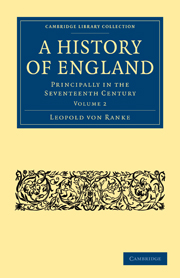Book contents
- Frontmatter
- Contents
- BOOK VI GOVERNMENT IN ENGLAND WITHOUT THE PARLIAMENT. TROUBLES IN SCOTLAND
- BOOK VII CONNEXION BETWEEN THE TROUBLES IN SCOTLAND AND THOSE IN ENGLAND AND ELSEWHERE
- BOOK VIII THE LONG PARLIAMENT AND THE KING, DOWN TO THE OUTBREAK OF THE CIVIL WAR
- INTRODUCTION
- CHAP. I Summoning of the Parliament
- CHAP. II The first sittings of the Long Parliament
- CHAP. III Progress of aggressive tendencies in the Lower House
- CHAP. IV Attempt at a Reaction
- CHAP. V Parliamentary and popular agitation. Execution of Strafford
- CHAP. VI Concessions and new demands
- CHAP. VII Charles I in Scotland
- CHAP. VIII Days of the Grand Remonstrance
- CHAP. IX Formation of a new Ministry. Tumultuous agitation in the Capital
- CHAP. X Breach between the King and the Parliament
- BOOK IX THE ENGLISH CIVIL WAR, 1642—1646
- BOOK X INDEPENDENTS AND PRESBYTERIANS. FATE OF THE KING
CHAP. IX - Formation of a new Ministry. Tumultuous agitation in the Capital
Published online by Cambridge University Press: 07 June 2011
- Frontmatter
- Contents
- BOOK VI GOVERNMENT IN ENGLAND WITHOUT THE PARLIAMENT. TROUBLES IN SCOTLAND
- BOOK VII CONNEXION BETWEEN THE TROUBLES IN SCOTLAND AND THOSE IN ENGLAND AND ELSEWHERE
- BOOK VIII THE LONG PARLIAMENT AND THE KING, DOWN TO THE OUTBREAK OF THE CIVIL WAR
- INTRODUCTION
- CHAP. I Summoning of the Parliament
- CHAP. II The first sittings of the Long Parliament
- CHAP. III Progress of aggressive tendencies in the Lower House
- CHAP. IV Attempt at a Reaction
- CHAP. V Parliamentary and popular agitation. Execution of Strafford
- CHAP. VI Concessions and new demands
- CHAP. VII Charles I in Scotland
- CHAP. VIII Days of the Grand Remonstrance
- CHAP. IX Formation of a new Ministry. Tumultuous agitation in the Capital
- CHAP. X Breach between the King and the Parliament
- BOOK IX THE ENGLISH CIVIL WAR, 1642—1646
- BOOK X INDEPENDENTS AND PRESBYTERIANS. FATE OF THE KING
Summary
The King was and remained determined to give way on neither point: while the anti-episcopalian tendencies were gaining the upper hand in the Commons, he had in a measure newly constituted the episcopal bench. The vacant sees, of which there was a great number, he filled without any limitation of their authority: in order to give proof of his genuine Protestant sentiments, he chose learned men of moderate views. Dr. Prideaux, one of the best professors at Oxford, a scholar and logician, and possessed of the most extensive theological learning, obtained the bishopric of Worcester. Dr. Brownrigge, a Cambridge Fellow, and possessing the sort of intellect at once solid and versatile, which is calculated to shine in public discussions, received the see of Exeter; Westfield, a popular preacher, that of Bristol. Bishop Hall, whose moderation had brought him under suspicion of being inclined to Presbyterianism, was advanced to the bishopric of Norwich; and Bishop Williams of Lincoln, who at the moment had developed a rare episcopal activity, to the archbishopric of York. Thus it was not the adherents of the Canterbury system, the old friends of Laud, who obtained the preference. The King wished to give the Church representatives free from all suspicion of a leaning towards Catholicism; and by this he caused the most thorough satisfaction to all the friends of the Church.
On November 25, the third day after that stormy sitting, he returned to London: once more he was welcomed with joyful sympathy, and as heartily as he could wish.
- Type
- Chapter
- Information
- A History of EnglandPrincipally in the Seventeenth Century, pp. 304 - 314Publisher: Cambridge University PressPrint publication year: 2010First published in: 1875



